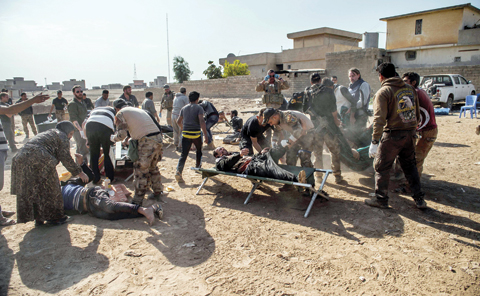Baghdad, Kurds at odds over post-Mosul division of territory
 MOSUL: Army medics and volunteers attend to an influx of patients suffering a multitude of injuries at an Iraqi Special Forces 2nd division open air field clinic in the Samah neighborhood of Mosul yesterday. — AFP
MOSUL: Army medics and volunteers attend to an influx of patients suffering a multitude of injuries at an Iraqi Special Forces 2nd division open air field clinic in the Samah neighborhood of Mosul yesterday. — AFPMOSUL: Iraqi forces piled pressure on the Islamic State group around Mosul yesterday, moving closer to cutting off the jihadists' escape route west to Syria and thrusting deeper into the east of the city.
Pro-government paramilitaries advancing on the town of Tal Afar, which commands the city's west approaches, entered its airport, while troops moving up from the south had the Mosul airport in their sights. Wounded civilians continued to stream out of the east of Mosul as government forces battled IS fighters on the streets.
The first casualties began arriving at a field clinic on the city's eastern edge after a mortar attack at around 11:00 am (0800 GMT), filling its nine blood-stained cots within minutes. Others were forced to sit on plastic chairs or lie on rugs in the dirt awaiting treatment. Mortar fire and bombs killed three children and wounded more than two dozen people yesterday morning alone, one of the clinic's staff, Hossam Al-Nuri, told AFP.
Medics zipped a white body bag around one of the dead, as a relative sobbed nearby. "We were waiting at home in Al-Samah to have lunch when the mortar round hit," said Hassan, who was wounded along with three of his brothers.
Lying on his side on a cot, Hassan frantically asked passing medics about his infant son Jassem, who was being treated nearby for wounds to his eyes.
Iraqi forces and civilians alike have paid a heavy price in the first month of the battle for Mosul, although casualty figures have not been released by the authorities.
Tightening noose
Hashed Al-Shaabi paramilitaries allied to the government were battling IS fighters and looking for booby traps inside Tal Afar airport, the last major objective before the town itself.
"Daesh has planted bombs in large parts of Tal Afar airport and operations are under way to clear it completely," the Hashed Al-Shaabi said in a statement.
Control of Tal Afar, some 50 kilometres (30 miles) from Mosul, would bring pro-government forces closer to surrounding IS in its last major Iraqi stronghold.
The city would be cut off from IS-controlled territory in Syria, where its de facto capital Raqa is also in the sights of US-backed forces. South of Mosul, advancing troops were nearing the city's airport.
An officer with elite interior ministry forces said a planned advance yesterday would bring them to within four kilometres (two and a half miles). Anti-IS fighters were also within striking distance of Mosul's northern neighborhoods while in the east elite counter-terrorism forces and army troops punching in from two directions were expected to join up despite stiff resistance.
Mass grave
Their strategy remains unclear, however, and Michael Knights of the Washington Institute for Near East Policy said it was hard to know whether the worst was yet to come. "We could be fighting through a hard crust with a soft inside, or it could be all hard," he said. Human Rights Watch issued a statement yesterday that included accounts by residents of the Hamam al-Alil area south of Mosul suggesting that a mass grave found there contains the bodies of former police killed by IS.
The grave was found outside the town of Hamam Al-Alil on November 7 after troops overran it in their drive north. One witness told HRW that over two nights last month at least 230 people, some of them former police, were brought to the site and may have been executed there.
"This is another piece of evidence of the horrific mass murder by (IS) of former law enforcement officers in and around Mosul," said HRW deputy Middle East director Joe Stork.
According to the United Nations, nearly 60,000 people have been displaced since the offensive to retake Mosul was launched on October 17.
Division of territory
Iraq's premier and its Kurdish regional chief were publicly at odds yesterday over territorial control after the recapture of Mosul, even with the battle for the city far from over. The war against the Islamic State (IS) group to recapture Mosul, the jihadists' last main stronghold in Iraq, has seen the autonomous Kurdistan region gain or solidify control over swathes of disputed territory in northern Iraq. A long-running territorial row between Kurdistan and Baghdad has been overshadowed by the battle against IS, but with the end of largescale fighting against the jihadists in sight, it is again moving to the fore.
Kurdish leader Massud Barzani and Iraqi Prime Minister Haider Al-Abadi are giving vague but nonetheless differing interpretations of understandings on who will control territory in the Mosul area after the city is retaken. "We are in agreement with the United States on not withdrawing from the areas of Kurdistan," Barzani said during a visit to the recaptured town of Bashiqa on Wednesday.
Iraqi Kurdistan has long insisted that areas skirting its official boundary that stretches from the border with Syria in the west to Iran in the east are part of the territory it should control-a position strongly opposed by Baghdad.
"These areas were liberated by the blood of 11,500 martyrs and wounded from the peshmerga" Kurdish fighters, Barzani said. "It is not possible after all these sacrifices" to return them to direct federal control." - Agencies










